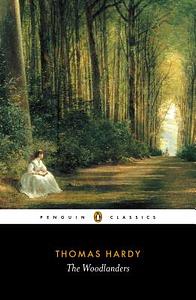Take a photo of a barcode or cover
This book is going straight onto my list of favorites. I found myself reading at every free moment, which rarely happens with books from the nineteenth century. Not that they're not good, but they tend to be more meditative than acutely riveting (by today’s standards, at least).
The Woodlanders is riveting, however. While it takes Hardy a moment to set up the story, once it is up it is really running. I love his writing; from the careful way he plans out his plots, to his Romantic views of nature, and from his implicit feminist critiques to the almost cinematic quality of his scenes.
Hardy possesses a kind of cinematic sensibility that is all the more striking considering that the very movie ever made came out a year after this book was published. In other words, there are times his scenes are so vivid, they feel like movie scenes, but film did not exist yet. A few scenes in particular come to mind:
- Giles seeing Grace as he walks home at night, her room lit by multiple candles, as she picks out clothes for visiting Mrs. Charmond;
- Grace visiting Dr. Fitzpiers for the first time, and seeing him awake in the mirror, then asleep when she turns to look;
- The “love” ritual shared by all the town girls, on a hill outside the town;
- Dr. Fitzpiers spying first Suke and then Grace from his window as they approach the newly painted fence;
- The thunderstorm in the woods.
In all those scenes (and many more) Hardy seems to direct the reader’s gaze and plays with light and looks (yes, really!) in a way that directors and cinematographers do. Absolutely fantastic, as if you’re getting a literal inside glimpse of the Victorian era.
I have always enjoyed Hardy’s writing, but this book is by far my favorite. The town of Little Hintock just felt so real, and I loved Grace, Giles, Marty, and even Dr. Fitzpiers (towards the end), all of whom felt like people very much alive.
And of course, his writing is beautiful, as always:
“She looked towards the western sky, which was now aglow like some vast foundry wherein new worlds were being cast” (79).
“He dreamed and mused till his consciousness seemed to occupy the whole space of the woodland round, so little was there of jarring sight or sound to hinder perfect mental unity with the sentiment of the place” (165).
“He set out to look for Giles on a rimy evening when the woods seemed to be in a cold sweat; beads of perspiration hung from every bare twig; the sky had no colour, and the trees rose before him as haggard, grey phantoms whose days of substantiality were passed” (270).
By the end, I was reading it at midnight, almost falling asleep but unable to stop. To write a story with such power that it has that effect on a reader 136 years later is a testament to Hardy’s brilliance.
While I was reading, a very satisfying alternate ending came to my mind, starting from when Fitzpiers was thrown off the horse the second time...
---------may be spoilers for purposes of comparison--------
Mrs. Charmond agrees to hide Fitzpiers and post his letter. Unfortunately for him, she now knows he's also been sleeping with Suke Damson, and her pride is injured. She poisons the bastard, hides his body, goes abroad, and is never seen again in Little Hinton.
The Melbury's assume, from Fitzpiers' letter and from the fact that Mrs. Charmond is also gone, that they have run away together. So Melbury still goes through the same wild goose chase of trying to end Grace's marriage and fix her up with Giles. It still ends in failure.
Mrs. Charmond dies abroad, leaving Grace all of her money out of guilt.
Someone finds Fitzpiers' body while preparing Mrs. Charmond's house for the next occupant. Giles and Grace agree to marry after a suitable time of mourning has passed. However, due to Giles' repeated illnesses, he dies before the wedding (it's Hardy, after all).
Suke Damson marries Tim, but their first child (delivered a couple months after their wedding) doesn't look at all like Tim.
Mr. Melbury wants Grace to use Mrs. Charmond's money to go to Budmouth or Bristol and live as a lady, and find a suitable husband. Grace puts a cap on his advice this time, and stays with her family. The family lives happily together for some time (even though Melbury caused so many problems for Grace, he loved her so much that I wanted him to have a happy ending). Darling the horse also gets some well-deserved rest.
Grace takes over her father's business upon his death and hands the management over to Marty South, since she's the most competent person there. The two women become good friends, and Grace eventually brings Marty to live with her as a companion. They go abroad every Winter with Mrs. Charmond's money, but always return home in time to see the apple blossoms. Every year, they make cider with Giles' machine in his memory.
Maybe they both marry many years later in the epilogue, or maybe they don't.
---------may be spoilers for purposes of comparison--------
Mrs. Charmond agrees to hide Fitzpiers and post his letter. Unfortunately for him, she now knows he's also been sleeping with Suke Damson, and her pride is injured. She poisons the bastard, hides his body, goes abroad, and is never seen again in Little Hinton.
The Melbury's assume, from Fitzpiers' letter and from the fact that Mrs. Charmond is also gone, that they have run away together. So Melbury still goes through the same wild goose chase of trying to end Grace's marriage and fix her up with Giles. It still ends in failure.
Mrs. Charmond dies abroad, leaving Grace all of her money out of guilt.
Someone finds Fitzpiers' body while preparing Mrs. Charmond's house for the next occupant. Giles and Grace agree to marry after a suitable time of mourning has passed. However, due to Giles' repeated illnesses, he dies before the wedding (it's Hardy, after all).
Suke Damson marries Tim, but their first child (delivered a couple months after their wedding) doesn't look at all like Tim.
Mr. Melbury wants Grace to use Mrs. Charmond's money to go to Budmouth or Bristol and live as a lady, and find a suitable husband. Grace puts a cap on his advice this time, and stays with her family. The family lives happily together for some time (even though Melbury caused so many problems for Grace, he loved her so much that I wanted him to have a happy ending). Darling the horse also gets some well-deserved rest.
Grace takes over her father's business upon his death and hands the management over to Marty South, since she's the most competent person there. The two women become good friends, and Grace eventually brings Marty to live with her as a companion. They go abroad every Winter with Mrs. Charmond's money, but always return home in time to see the apple blossoms. Every year, they make cider with Giles' machine in his memory.
Maybe they both marry many years later in the epilogue, or maybe they don't.
emotional
reflective
sad
slow-paced
Plot or Character Driven:
Character
emotional
reflective
slow-paced
Plot or Character Driven:
Character
Strong character development:
Yes
Loveable characters:
Complicated
Diverse cast of characters:
No
Flaws of characters a main focus:
Yes
emotional
sad
slow-paced
Plot or Character Driven:
Character
emotional
sad
slow-paced
Plot or Character Driven:
Character
Strong character development:
Yes
Loveable characters:
Complicated
Diverse cast of characters:
No
Flaws of characters a main focus:
Yes
dark
emotional
hopeful
reflective
relaxing
sad
slow-paced
Plot or Character Driven:
Character
Strong character development:
Yes
Loveable characters:
Yes
Diverse cast of characters:
No
Flaws of characters a main focus:
Yes
Wow. This is the seventh Thomas Hardy novel I've read and, despite always feeling like my heart has been ripped out, he is one of my favorite authors. This book seemed a little more understated and less complicated than the others I have read, but it is beautiful. I loved the nuances of all the characters. The plot is something I could still see happening today.
challenging
dark
emotional
sad
tense
slow-paced
I'm one of those people that likes meandering prose. Back in High School, I read The Return of the Native and was, quite possibly, the only person who liked it. I remember many complaints of the, seemingly, neverending descriptions of the heath. Same goes for this book. It honestly could have been half as long and conveyed just as much. But I like the way Thomas Hardy describes things. It's lyrical. It's poetic. It's relaxing. And so, despite the fact that this book can be summed up as follows - "Boy loves girl. Girl loves boy. Girl meets rich boy. Father demands wedding to rich boy. Girl has no backbone to go against father. Girl marries rich boy and lives to regret it. Oh, and OG Boy meets an unexpected ending. - I still really enjoyed it. Thomas Hardy, and The Woodlanders in particular, is a reading experience. Not so much for the destination, but for the journey.



